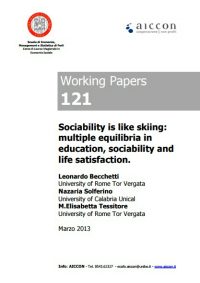121- Sociability is like skiing: multiple equilibria in education, sociability and life satisfaction
Abstract
Empirical evidence documents that other regarding activities (voluntary/charity work, helping friends/neighbours) done with other regarding motivations contribute positively and signi cantly to subjective wellbeing. The question is why only a re- stricted group of people performs these activities with such motivations if doing so adds up to satisfaction in life. We develop a model in which individual’s utility grows in the consumption of a stimulus” goods which may however be enjoyed only with a su cient level of investment in civic capital.
The stimulus good (a contingent good produced by the interaction of an action with a motivation) is represented by the perfor- mance of other regarding activities with other regarding motivations and civic capital may be accumulated through education. The model has multiple equilibria since more patient individuals accumulate along their lives enough civic capital which allows them to enjoy such goods. Less patient individuals do not accumulate enough civic capital and therefore cannot enjoy performing these activities even if they observe others doing so.
We test our theoretical predictions by comparing a group of Europeans aged above 50 who performs other regarding activities with other regarding motivations with a group of the same age which does not perform such activities. Parametric and non parametric tests document that the rst group has signi cantly more schooling years coupled with higher cognitive and eudaimonic life satisfaction. Our results are robust to several checks among which health shocks, variations in local social norms and con- sistent with the procedural utility hypothesis arguing that not only outcome but also all other circumstances of action matter for subjective wellbeing.
Keywords: sociability, education, life satisfaction.
JEL numbers: A13, D13, D64.

